The Top 10 Guitarists That Adam Jones Listed As His Favorites
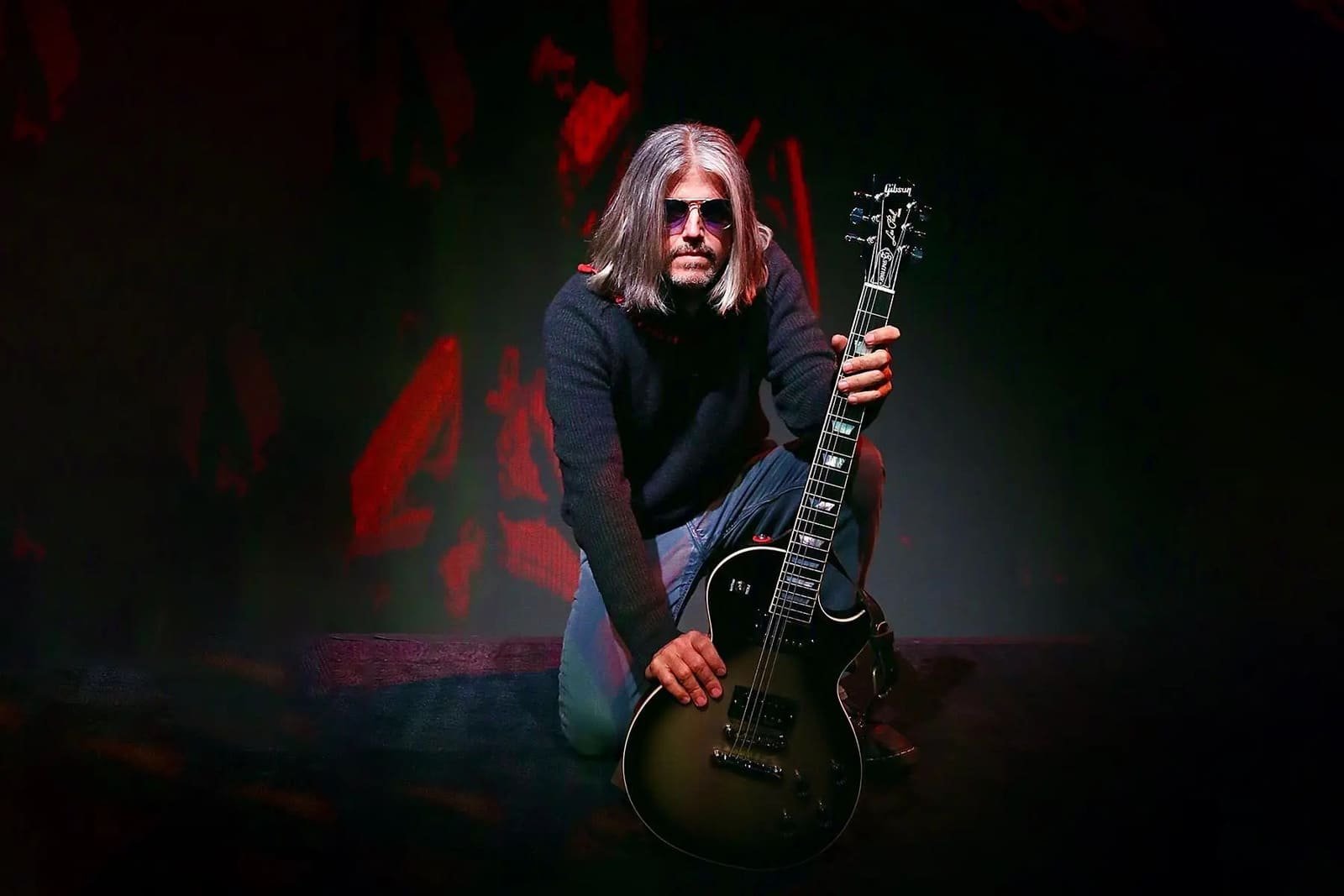
Adam Jones picks his favorite guitarists of all time. Tool‘s guitarist Adam Jones adds his guitar technique and solo parts to music bands like Tool. In this article, we will look at the guitarists that Adam Jones listed his favorite of all time.
Adam Jones, the visionary guitarist behind the well-known band Tool, has always fascinated fans with his extraordinary guitar talent and ability to build unique musical landscapes. He has become famous in progressive and alternative music genres for his attention to detail, creative use of effects, and atmospheric style.
Electric Sheep was a garage rock band from the early 1980s. The band was unsuccessful, but one of its members became well-known: Adam Jones.
In addition to The Byrds, The Allman Brothers Band, The Yardbirds, MC5, Sonic Youth, Crosby, Stills, Nash & Young, The Stills-Young Band, and Radiohead, the band is the only one with two guitarists who made it onto Rolling Stone’s list of the 100 best guitarists in rock history. Adam Jones also has one-of-a-kind guitars from Gibson and other manufacturers.
Jones’ musical adventure began in the early 1990s when he co-founded Tool. His guitar playing became essential to the band’s sound, defined by deep layers, intricate rhythms, and haunting melodies.
Also, Adam Jones participated in various artistic projects in addition to his talents to Tool. He has contributed his abilities to film by working as a visual artist and creating compelling music videos and album artwork. Jones’ eclectic approach to his trade shows his ambition to break down barriers and produce a comprehensive artistic experience.
Adam Jones worked on “Jurassic Park,” “Terminator 2: Judgment Day,” “Dances with Wolves,” “Ghostbusters II,” “A Nightmare on Elm Street 5: The Dream Child,” “A Nightmare on Elm Street 4: The Dream Master,” “Predator 2,” and many more films.
And also, Tool guitarist Adam Jones’s net worth is around $50 million.
Adam Jones’s Favorite Guitarists of All Time
Tool guitarist Adam Jones has also been known to share his respect for guitarists that play hard for every new album. Jones picks his guitarists of all time you can check them below!
Who inspired Adam Jones?
- Paul Leary (Butthole Surfers)
- Adrian Belew (King Crimson)
- Ronald Jones (The Flaming Lips)
- Trey Gunn (King Crimson)
- Buzz Osborne (Melvins)
- Fredrik Thordendal and Mårten Hagström (Meshuggah)
- Andy Gill (Gang of Four)
- Dr. Know (Bad Brains)
- Robert Fripp (King Crimson)
In an interview with Guitar World Magazine, Tool‘s guitarist Adam Jones shared the Top 10 Guitarists of All Time. Check out Adam Jones‘s favorite guitarists below!
1. Paul Leary (Butthole Surfers)
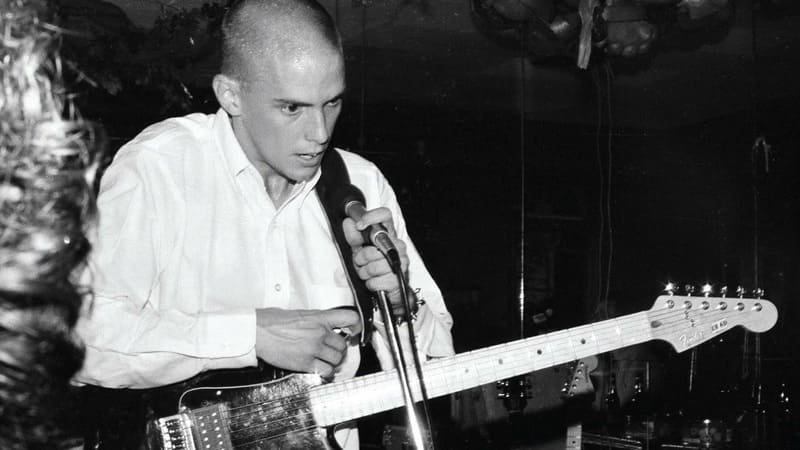
The famous guitarist and essential character in the music world, Paul Leary, has made an indelible stamp on the landscape of guitar-driven rock. Leary’s talents have helped define the aural tapestry of various prominent bands, including the Butthole Surfers and several other collaborations. He is known for his outstanding musicianship, unique approaches, and genre-defying attitude.
Leary’s musical adventure began in the late 1970s in the thriving underground culture of Austin, Texas. As a founding member and lead guitarist, he promoted the Butthole Surfers’ sound to unparalleled innovation and unpredictability.
Leary’s talent has been sought after by various musicians in addition to his work with the Butthole Surfers. Collaborations with prominent artists such as Gibby Haynes, Lou Reed, and Daniel Johnston have revealed his skills to adapt his playing technique to many genres.
Leary’s approach to the guitar has often pushing the limits and launched into unexplored areas. His innovative use of sampling, feedback loops, and odd guitar tunings has won him a reputation as a sonic explorer, constantly pushing what a six-string instrument can achieve.
In addition to his exceptional guitar talents, Leary has established himself as a songwriter and producer.
His contributions to the Butthole Surfers’ catalog, mainly their breakout smash “Pepper,” highlight his ability to produce memorable hooks and appealing melodies. At the same time, his production work has assisted in capturing the distinct soul of several musicians.
Adam Jones tells why he likes Paul Leary as one of his favorite guitarists of all time:
“Fripp’s playing caused me to ‘wake up’ to music when I was younger. Later, when we were to tour with King Crimson, I remember being horrifically nervous to meet him. But he was so gracious and ended up teaching me the two most important things about playing: attitude and discipline.
2. Adrian Belew (King Crimson)
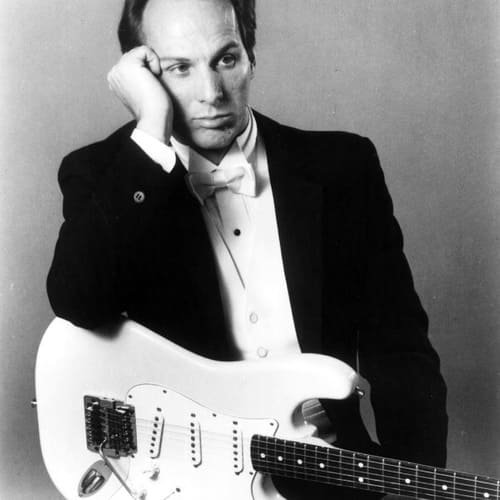
Adrian Belew, a guitarist, and multi-instrumentalist, has long been admired for his innovative contributions to music.
Belew’s musical career began in the early 1980s when he joined the progressive rock band King Crimson. His original guitar work, distinguished by its dynamic tone, approaches, and clever use of effects, immediately established him as a great pioneer. His contributions to essential albums by King Crimson, like “Discipline” and “Beat,” demonstrated his ability to integrate melodies with complicated rhythmic patterns flawlessly.
Belew’s collaborations and solo goes have cemented his stature as a musical force to be reckoned with, in addition to his work with King Crimson. He has worked with a wide variety of musicians, including David Bowie, Talking Heads, and Nine Inch Nails, to name a few.
Belew’s mastery of guitar technology is one of his most significant accomplishments. His innovative use of guitar synthesizers and MIDI controllers has enabled him to build a substantial musical palette, effectively transforming his guitar into an infinite source of sound. Also, Adrian Belew’s ability to combine classical guitar sounds with synthetic textures and otherworldly effects has expanded the guitar’s capabilities.
In addition to his musical abilities, Belew is a lyricist and vocalist. His solo albums, such as “Desire of the Rhino King” and “Mr. Music Head,” demonstrate his ability to write great tunes and thought-provoking lyrics.
Adam Jones shares why he likes Adrian Belew as one of his favorite guitarists of all time:
“People don’t bring up Adrian Belew enough, and I think he’s just as heavy as Fripp. Adrian plays straight from his heart, so some of his lead structures defy the classical approach to scales and teaching. He is also really into new technology. But he uses it in a very thought-out and tasteful way.”
3. Ronald Jones (The Flaming Lips)
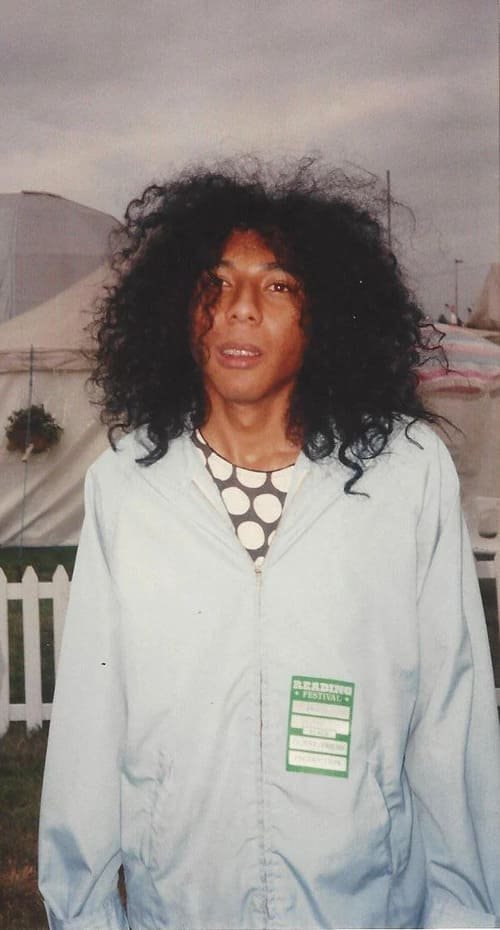
Ronald Jones, an extraordinary guitarist noted for his technical brilliance and inventive approach, has left an unforgettable imprint on the music world. Jones has established himself as a genuine virtuoso, pushing the frontiers of what is possible on the guitar with his incredible speed, nuanced phrasing, and genre-defying approach.
Jones increased to reputation as a member of the popular alternative music band The Flaming Lips in the 1990s. His guitar playing became a distinguishing feature of the band’s sound, injecting it with a distinct combination of psychedelic, shoegaze, and experimental rock. Jones’ contributions to albums such as “Clouds Taste Metallic” and “Zaireeka” demonstrated his ability to merge melodic sensibilities with sophisticated arrangements.
Jones has started on various solo projects in addition to his work with The Flaming Lips, demonstrating his artistic versatility and infinite innovation. His solo recordings, such as “The Magical World of the Strands” and “Bikini Tennis Shoes,” go into new sonic territory while revealing a more contemplative side to his artistry. Ronald Jones’ solo work has allowed him to explore complicated compositions and auditory soundscapes, pushing the boundaries of his own playing even further.
Ronald Jones’ artistic impact stretches well beyond his own musical circles. His clever approach and innovative playing style have encouraged a new generation of guitarists to explore their own creative boundaries.
Ronald Jones‘ passion for his craft and the constant pursuit of artistic expression confirms that his imprint on the guitar world will be felt for years as he continues to explore new musical limits.
Adam Jones claims why he likes Ronald Jones as one of his favorite guitarists of all time:
“Ronald Jones was this completely innovative guitarist that used to play in the Flaming Lips. He used to play with a quarter for a pick, so he could slide it down the strings. I have also never seen a guitarist with so many effect pedals. But like the King Crimson guys, Ronald was so good at incorporating new technology tastefully. He’s another guy that played from his heart and not his head.”
4. Trey Gunn (King Crimson)
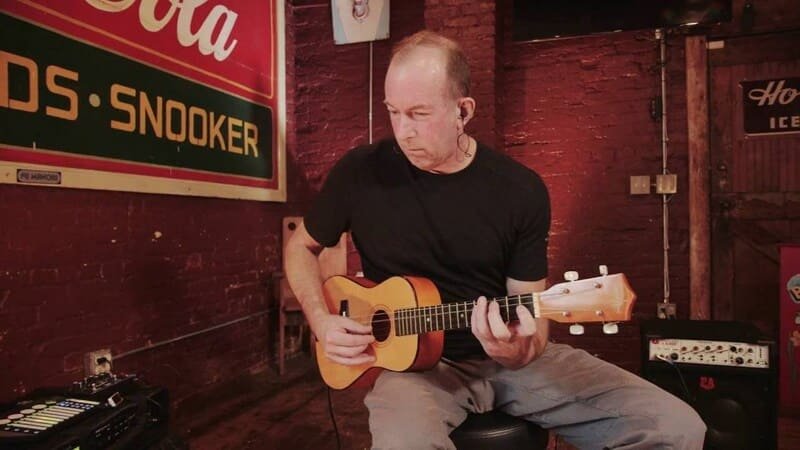
Trey Gunn, the progressive rock musician and guitarist, has left an unforgettable impression on the music industry with his boundary-pushing style and remarkable skill. Gunn is most known for his mastery of the Warr guitar, a unique instrument that combines parts of guitar and bass. He has continuously pushed the boundaries of what can be accomplished with six strings.
Gunn became famous in the 1990s as a member of the legendary progressive rock band King Crimson. Gunn’s elaborate and fascinating playing, which sometimes combined complicated tapping methods and intricate chord voicings, became a distinctive feature of King Crimson’s subsequent albums, including “Thrak” and “The ConstruKction of Light.”
He has had a happy solo career and worked with King Crimson, always exploring new frontiers and collaborating with diverse musicians. His solo albums, such as “The Third Star” and “I’ll Tell What I Saw,” highlight his exceptional composing abilities and ability to flawlessly integrate elements of progressive rock, world music, and ambient soundscapes.
Gunn is a talented songwriter and producer, in addition to his musical abilities. Also, his collaborations with musicians such as David Sylvian and Robert Fripp have further illustrated Gunn’s flexibility and passion.
Adam Jones reveals why he likes Trey Gunn as one of his favorite guitarists of all time:
“I know Trey Gunn plays the Chapman stick and the Warr guitar, but it’s still ‘guitaring’ to me. His left- and right-hand approach is like that of a classical pianist. He gave me some lessons to improve hand coordination, and I felt like I was learning how to play guitar all over again!
I still haven’t gotten to the level where I can go back to him and say, “Okay, I’ve got this down. Show me the next thing.”
5. Buzz Osborne (Melvins)
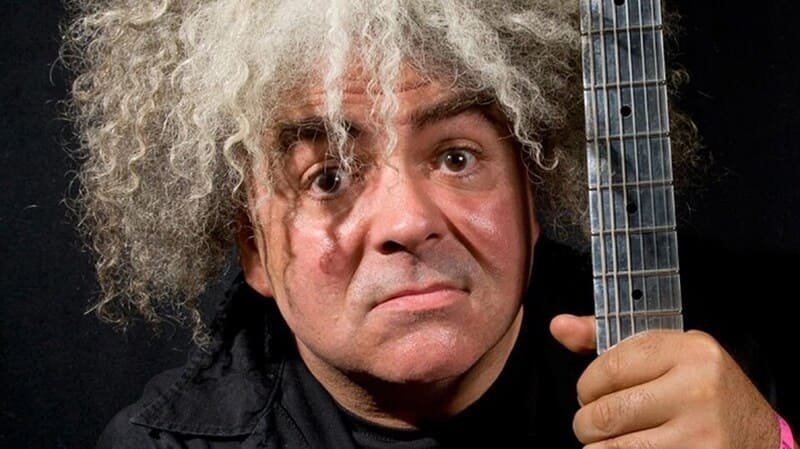
Buzz Osborne, the guitarist and founding member of the famous Melvins, has made an unforgettable impression on the music industry with his uncompromising attitude and sound creativity. Osborne has become well-known in alternative, sludge, and experimental rock due to his unique guitar tone, violent playing technique, and brave exploration of genres.
His musical career began in the 1980s when he created the Melvins, a band that inspired and influenced other performers from various genres. His guitar work, with its solid and variations riffs, massive soundscapes, and song structures of what rock music might be.
Osborne has worked with many musicians, including Mike Patton, Tool, Jello Biafra, and the Melvins. These collaborations have further demonstrated his versatility and ability to adapt his playing approach to various musical environments. Buzz Osborne’s contribution to the genre of guitar-driven music goes well beyond his technical ability.
His uncompromising, honest approach to songwriting and performance has encouraged generations of musicians to embrace their uniqueness and pursue their own creative pathways. Various bands and artists inspired by Osborne’s uncompromising mindset may be heard in their work.
Adam Jones shares thoughts about why he likes Buzz Osborne as one of his favorite guitarists of all time:
“Buzz’s playing has those same qualities of attitude and discipline that I learned from Fripp. The Melvins’ style is also so brutal. They rip their guts out every time they play. Where I do more of a shoegazer thing onstage, Buzz will microwave a crowd. Many people don’t recognize the Melvins’ importance, and unfortunately they probably won’t until the band’s dead and gone.”
6. Fredrik Thordendal (Meshuggah)
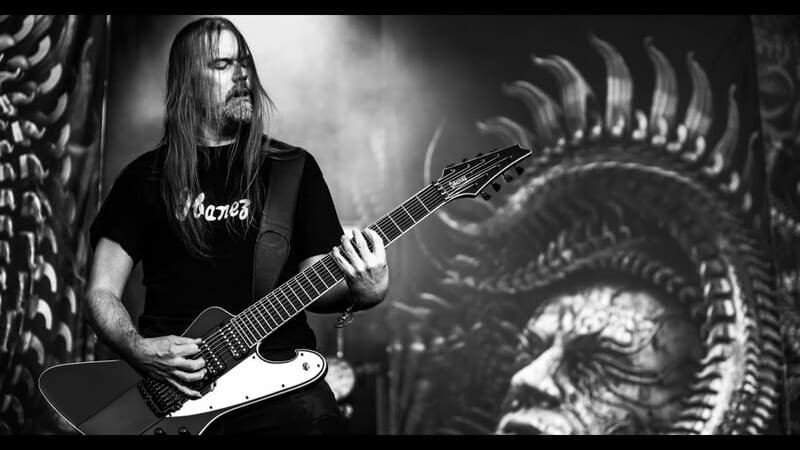
Fredrik Thordendal, the guitarist and creative person behind Meshuggah, has established himself as an absolute master of his art, stunning listeners with his unrivaled technical ability and approach to guitar playing. Thordendal has been a prominent character in progressive metal due to his unique usage of extended-range guitars, dense polyrhythms, and mind-bending songs.
Thordendal’s musical adventure began in the late 1980s with the foundation of Meshuggah. His guitar playing became the driving force behind the band’s characteristic sound, characterized by rhythms, chords, and execution.
Thordendal participated in several solo projects and collaborations outside Meshuggah, demonstrating his flexibility and broad musical tastes. “Sol Niger Within,” his solo album, delves into ambient and experimental territory, showing his talent to create atmospheres as intriguing as they are technically brilliant.
Collaborations with musicians like Devin Townsend and Anneke van Giersbergen show Thordendal’s broad musical tastes.
7. Andy Gill (Gang of Four)
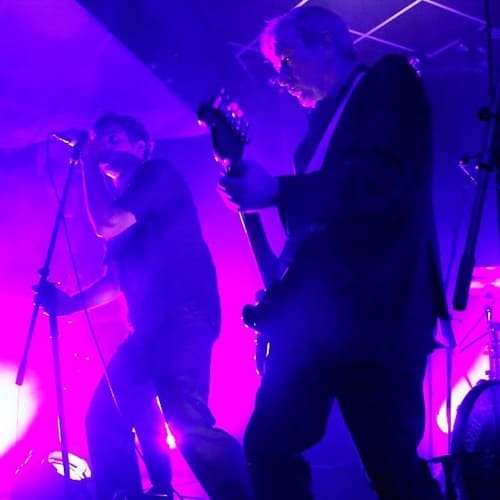
Andy Gill, a famous guitarist and founding member of Gang of Four band, has made an unforgettable impression on the music world with his distinct playing style and inventive approach. Gill’s contributions to post-punk, new wave, and alternative music have left an indelible mark thanks to his razor-sharp riffs, angular guitar lines, and politically charged lyrics.
Gill’s musical career began in the late 1970s with the formation of Gang of Four. His guitar work became the ambitious force behind the band’s particular sound, distinguished by its intensity, intricate rhythms, and socially aware themes.
Gill’s abilities expanded beyond his work with Gang of Four to production and cooperation. He worked on records for The Stranglers and Red Hot Chili Peppers, showing his ability to capture the raw core of a band’s music while pushing the frontiers of audio innovation.
Additionally, Gill’s collaborations with musicians such as Michael Hutchence, Bono, and R.E.M. demonstrated his versatility and ability to adapt his guitar abilities to many musical situations.
8. Dr. Know (Bad Brains)
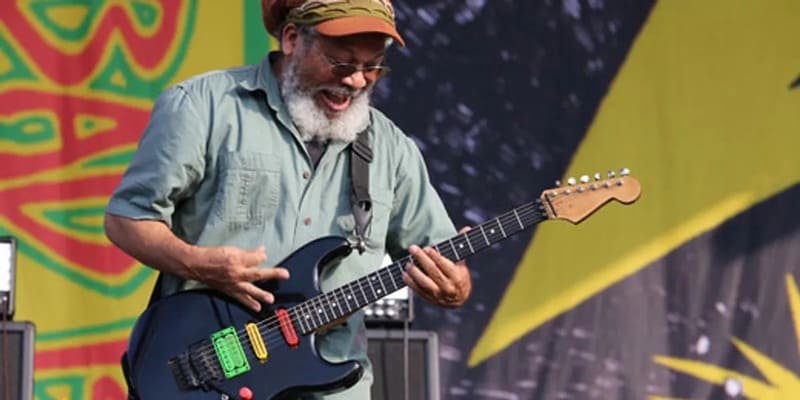
Dr. Know, the iconic guitarist and founding member of the influential punk band Bad Brains, has made an unforgettable impression on the music world with his burning guitar technique and style.
Dr. Know’s musical career began in the late 1970s with the formation of Bad Brains. His guitar work became synonymous with the band’s fierce and explosive sound, distinguished by breakneck speed, tremendous intensity, and a combination of punk, reggae, and metal elements. Dr. Know’s ability to merge these different genres while integrating complex guitar solos and intricate harmonies distinguished Bad Brains as a forerunner in the punk era.
Dr. Know’s skills expanded beyond his work with Bad Brains to production and cooperation. He collaborated with various acts, including the Beastie Boys and Parliament-Funkadelic, demonstrating his flexibility and impact in the music industry.
Collaborations with musicians from diverse genres revealed Dr. Know’s ability to adapt his guitar talents to numerous musical events.
Adam Jones tells why he likes Dr. Know as one of his favorite guitarists of all time:
“I’d always liked Bad Brains, but I’d never seen them live until I moved to California. They started playing and all of a sudden – H.R. came flying over the drum kit -there must have been a trampoline back there – hit the stage, wiped out and then started singing. It was absolutely amazing.
Dr. Know was way ahead of his time. Who knows what was fueling his fire, but there was definitely fire being fueled”
9. Robert Fripp (King Crimson)

Robert Fripp is a well-known guitarist and founding member of the band King Crimson. Fripp’s musical career began in the late 1960s when he created King Crimson, a band that became one of the most influential and acclaimed in the world of progressive rock.
His particular guitar style, characterized by melodies, solos, and practical use of effects, became the driving force behind King Crimson’s distinct sound. Fripp’s skills combine rock, jazz, classical, and avant-garde elements.
He has worked with a wide range of musicians, including David Bowie, Peter Gabriel, and Brian Eno, among many others. Fripp’s guitar contributions to albums such as David Bowie‘s “Heroes” and Peter Gabriel’s “Peter Gabriel II” demonstrated his ability to modify his playing approach to match and enhance other musicians’ visions.
Using a tape delay technology known as “Frippertronics” also resulted in a trademark sound that has influenced generations of guitarists.
10. Mårten Hagström (Meshuggah)

Mårten Hagström is a guitarist and founder of Meshuggah, a well-known metal band.
Hagström’s musical adventure began in the late 1980s with the foundation of Meshuggah. Meshuggah were pioneers of the progressive metal style due to Hagström’s mastery of unique time signatures and polyrhythmic rhythms and his ability to effect churning and guitar noises.
Hagström cites Rush, James Hetfield, Squarepusher, Autechre, Strapping Young Lad, and GISM as inspirations.
In an interview, Hagström stated, “You can’t play an instrument for the technicality of it.” It’s a tool for getting what’s within and outside of you out.”
He also noted that when he first began learning guitar, the widespread tendency was for increasingly virtuosity lead playing, and he focused instead on creating his precise rhythm guitar technique.
Adam Jones tells about why he likes Mårten Hagström and Fredrik Thordendal as one of his favorite guitarists of all time:
“These guys have taken the Swedish metal genre completely off the path and into an extremely innovative area. I hate to single out Fred, but he’s just great. He has an incredible lead style. But both of those guys are fucking amazing.”
What are your thoughts on Tool‘s Adam Jones’s favorite guitarists of all time? Let me know in the comment section!
Belew had toured with David Bowie, Frank Zappa, and Talking Heads before playing with Fripp and King Crimson.
Buffalo Springfield, Metallica and The Beatles all had 2 guitarist on rolling stones 100 greatest guitarists…so the use of the word “only” was a poor choice.